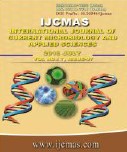


 National Academy of Agricultural Sciences (NAAS)
National Academy of Agricultural Sciences (NAAS)

|
PRINT ISSN : 2319-7692
Online ISSN : 2319-7706 Issues : 12 per year Publisher : Excellent Publishers Email : editorijcmas@gmail.com / submit@ijcmas.com Editor-in-chief: Dr.M.Prakash Index Copernicus ICV 2018: 95.39 NAAS RATING 2020: 5.38 |
A developed human society in today’s era needs advancement in food production and yield to feed the ever blooming monstrous population. The existing feed supply resources are however confronted with a variety of environmental complexities like the global warming, curtailment of the agricultural lands and deterioration of the resources supporting the crop production. Abiotic stress like heat, cold, drought, flood, heavy metal etc create unfavourable condition for crop plant which effect its growth, survival and reproduction. These abiotic stresses induce various adaptive, biochemical and physiological responses in plants in order to preserve their homeostatic equilibrium. Abiotic stresses also exert substantial effects on the production of several bioactive compounds in plants and cause the increases in the level of sugars, soluble proteins, antioxidant enzymes, proline, chlorophyll, the appearance of new isoforms of protein and change in membrane lipid composition. The present study aims at studying the effect of heat stress on wheat varieties and their mechanisms to combat the stress. Five varieties of crops namely Wheat (Lok-1, Raj.4120, Raj.4037, Raj 3765 and DBW-90), Mustard (Pusa Bold, Pusa Jai Kisan, RH 0749), Chickpea (Pratap Chana, GNG-1581), Mung (JPM-02-03C/SI), and Soyabean (JP-95-60) were taken. These were grown on MS media and high temperature was levied after the appearance of plantlets for continuous five days. The plantlets were excised after 15 days of inoculation for further analysis. Different morphological parameters including shoot-root height and weight were measured. The heat stress caused specific changes in the biochemical potential of the plant and was measured by observing the chlorophyll amounts, antioxidants including Peroxidase (POX), Ascorbate peroxidase (APX) and polyphenol peroxidase (PPO) enzyme activities and also ospmoprotectants like proline. Morphological studies revealed best performance of Raj 4037 and Raj 3765 varieties under high temperature. A significant increase in the antioxidative enzyme activity was also noted in these varieties. The MDA and proline content was significantly high in these varieties after stress application suggesting that they are better suited to combat the oxidative stress injury amongst all varieties. The study concluded that Raj 4037 and Raj 3765 varieties of wheat, Pusa Jai Kisan of mustard and GNG-1581 of gram were best suitable for the Rajasthan in the increasing intricacy of global temperature rise. Amongst soyabean and mung, Soyabean in better adapted to grow under higher temperatures. A developed human society in today’s era needs advancement in food production and yield to feed the ever blooming monstrous population. The existing feed supply resources are however confronted with a variety of environmental complexities like the global warming, curtailment of the agricultural lands and deterioration of the resources supporting the crop production. Abiotic stress like heat, cold, drought, flood, heavy metal etc create unfavourable condition for crop plant which effect its growth, survival and reproduction. These abiotic stresses induce various adaptive, biochemical and physiological responses in plants in order to preserve their homeostatic equilibrium. Abiotic stresses also exert substantial effects on the production of several bioactive compounds in plants and cause the increases in the level of sugars, soluble proteins, antioxidant enzymes, proline, chlorophyll, the appearance of new isoforms of protein and change in membrane lipid composition. The present study aims at studying the effect of heat stress on wheat varieties and their mechanisms to combat the stress. Five varieties of wheat (Lok-1, Raj.4120, Raj.4037, Raj 3765 and DBW-90) were taken. These were grown on MS media and high temperature was levied after the appearance of plantlets for continuous five days. The plantlets were excised after 15 days of inoculation for further analysis. Different morphological parameters including shoot-root height and weight were measured. The heat stress caused specific changes in the biochemical potential of the plant and was measured by observing the chlorophyll amounts, antioxidants including Peroxidase (POX), Ascorbate peroxidase (APX) and polyphenol peroxidase (PPO) enzyme activities and also ospmoprotectants like proline. Morphological studies revealed best performance of Raj 4037 and Raj 3765 varieties under high temperature. A significant increase in the ant oxidative enzyme activity was also noted in these varieties. The MDA and proline content was significantly high in these varieties after stress application suggesting that they are better suited to combat the oxidative stress injury amongst all varieties. The study concluded that Raj 4037 and Raj 3765 varieties were best suitable for the Rajasthan in the increasing intricacy of global temperature rise.
 |
 |
 |
 |
 |